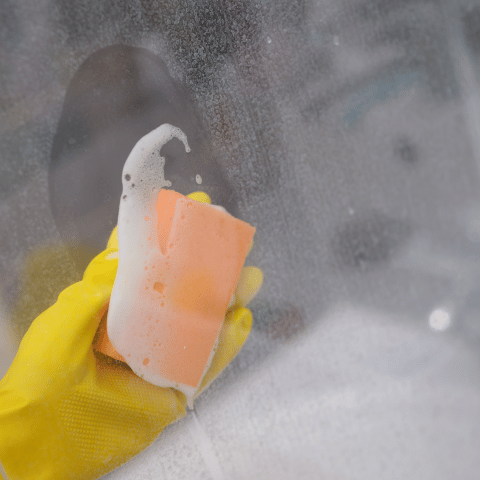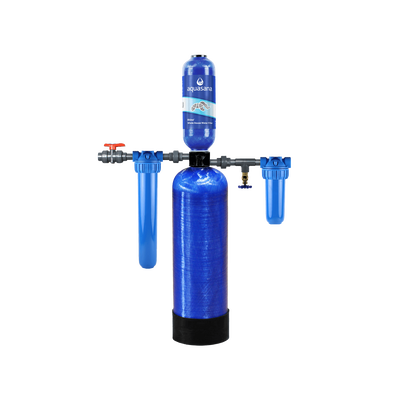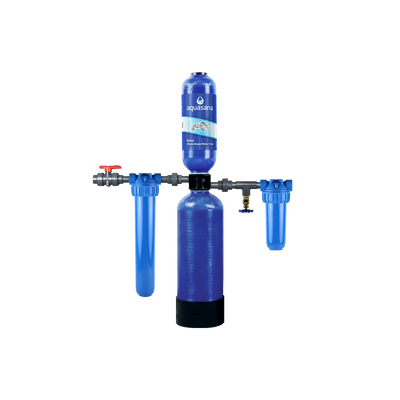What is hard water and why is it bad?
Hard water carries a high level of dissolved minerals, particularly magnesium and calcium. Although having hard water is not a health risk, it can be a nuisance because of the limescale buildup it can create inside your plumbing fixtures and appliances. If this buildup is left alone for too long, you can expect a costly repair bill somewhere in the future. It’s also associated with drying hair and skin, fading clothes, decreasing the effectiveness of your soaps, and leaving residue all over your glassware and faucets.
How to combat hard water
Now that you know how difficult hard water can be, let’s discuss ways to fight its effects.
1. Use baking soda
Baking soda’s alkaline properties neutralize minerals in hard water, which can help prevent damage to your clothes when doing laundry. You can sprinkle about half a cup into your washing machine along with your usual detergent, but be aware that baking soda can break down the fibers in materials like silk, wool, and cashmere and can cause discoloration. So use it only with sturdy fabrics that can handle the rough wash.
2. Add vinegar
Still worried about your clothes losing their life due to hard water? You can also add vinegar to your washing machine, as it’s a natural acid that can break down hard water minerals. You can also soak faucets and showerheads in vinegar overnight to dissolve hard water buildup. Just be careful how often you use this solution since vinegar can damage rubber seals and hoses which could lead to leaks.
3. Clean with citrus
Like vinegar, citrus also has natural acidity that can help dissolve hard water minerals. Some cleaners use citrus extract to dissolve mineral deposits left behind on your counters and shower walls, but you can also try mixing water with a squeeze of lemon juice to create a natural cleaning solution.
4. Distill your water
Distillation is the process of boiling water to create steam and then condensing it back into a liquid state. Distilled water has fewer unwanted minerals and contaminants present, making it a better option for drinking and even cleaning. However, it's hard to justify buying distilled water when you already pay for your own water at home. Distilling water yourself is also difficult because it requires a lot of heat and is not very energy efficient.
5. Boil and cool your water
Boiling your water can help if your water is temporarily hard, but not if you have permanently hard water. Without getting too into the weeds of the science, temporarily hard water is caused by calcium and magnesium bicarbonate, which come out when you boil water. However, permanently hard water is caused by calcium and magnesium sulfates, which cannot be removed from boiling. In fact, boiling permanently hard water can make it even harder because water evaporates making the mineral concentration higher. Furthermore, boiling water can also increase the concentration of lead, and it’s highly impractical for most purposes.

6. Install a water softener
A water softener is the most effective and practical long-term solution to dealing with hard water. It combats hard water by using a process called ion exchange to remove hard minerals before they enter your home’s plumbing. This means your water is being treated at the source and not after it goes through your pipes, ensuring that your plumbing stays in top condition.
What’s great about a water softener is that, unlike the options above, it addresses hard water without requiring you to do anything outside of installation and maintenance. You won’t need to take time to boil or distill water, and it prevents issues from happening so you don’t need to use DIY hacks to deal with hard water’s aftermath like stains on fixtures. Some softeners like our SimplySoft® 40,000 Grain Softener feature customizable control panels that enable you to tailor your system to your needs. Once set up, the system will run independently so you can stay worry-free while enjoying your softened water.
WHOLE HOUSE WATER SOFTENER
40,000 Grain Water Softener
Reduces minerals that cause hard water, providing softer, scale-free water from every tap in your home.
.png)
What’s the best way to combat hard water?
Although there are several DIY methods to combat hard water using household ingredients,, the only solution that’s worth your time is a water softener. Water softeners are the best solution for combating hard water because they’re specifically designed to address hard water at the source. Rather than dealing with what's left behind by hard water, a water softener treats your water before it enters your pipes, ensuring that every part of your home is supplied with softened water.
If you’re hesitant to make the jump because of the initial price tag, rest assured that a water softener is worth the investment. It can save you up to $497 annually* by improving appliance efficiency, minimizing repairs, and reducing soap and cleaning product costs. The SimplySoft® 40,000 Grain Softener and SimplySoft® 60,000 Grain Softener are designed with efficiency in mind, and proven to use 50% less salt and 28% less water than conventional softeners.
Ready to enjoy the benefits of softened water in your home? Shop our water softeners or reach out to our Water Experts to find the best set-up and configuration for your needs.


